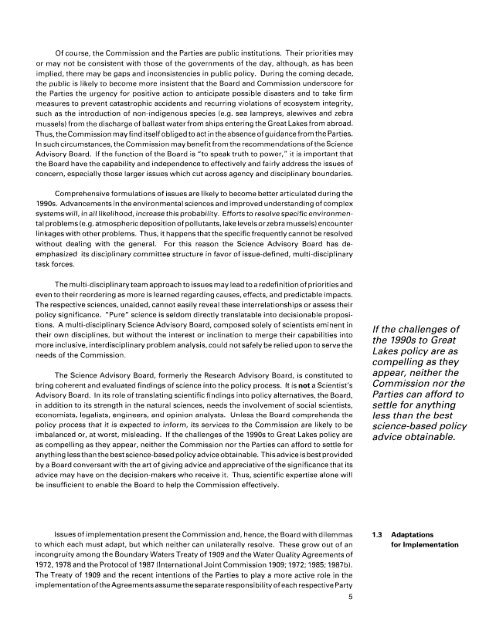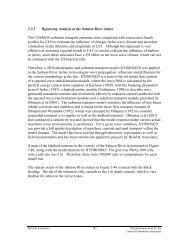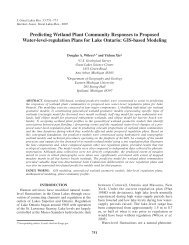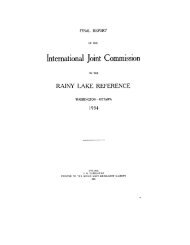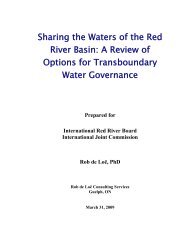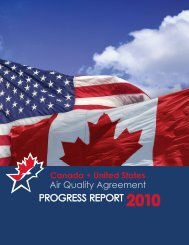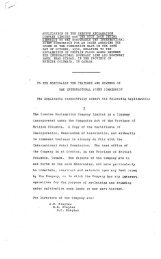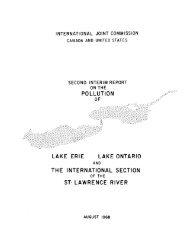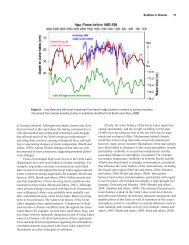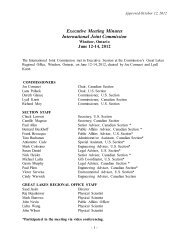International Joint Commission
International Joint Commission
International Joint Commission
Create successful ePaper yourself
Turn your PDF publications into a flip-book with our unique Google optimized e-Paper software.
Of course, the <strong>Commission</strong> and the Parties are public institutions. Their priorities may<br />
or may not be consistent with those of the governments of the day, although, as has been<br />
implied, there may be gaps and inconsistencies in public policy. During the coming decade,<br />
the public is likely to become more insistent that the Board and <strong>Commission</strong> underscore for<br />
the Parties the urgency for positive action to anticipate possible disasters and to take firm<br />
measures to prevent catastrophic accidents and recurring violations of ecosystem integrity,<br />
such as the introduction of non-indigenous species (e.g. sea lampreys, alewives and zebra<br />
mussels) from the discharge of ballast water from ships entering the Great Lakes from abroad.<br />
Thus,the<strong>Commission</strong> mayfind itselfobligedtoact in theabsenceofguidancefromtheParties.<br />
In such circumstances, the <strong>Commission</strong> may benefit from the recommendations of the Science<br />
Advisory Board. If the function of the Board is "to speak truth to power," it is important that<br />
the Board have the capability and independence to effectively and fairly address the issues of<br />
concern, especially those larger issues which cut across agency and disciplinary boundaries.<br />
Comprehensive formulations of issues are likely to become better articulated during the<br />
1990s. Advancements in the environmental sciences and improved understanding of complex<br />
systems will, in all likelihood, increase this probability. Efforts to resolve specific environmental<br />
problems (e.g. atmosphericdeposition of pollutants, lake levels or zebra mussels) encounter<br />
linkages with other problems. Thus, it happens that the specific frequently cannot be resolved<br />
without dealing with the general. For this reason the Science Advisory Board has deemphasized<br />
its disciplinary committee structure in favor of issue-defined, multi-disciplinary<br />
task forces.<br />
The multi-disciplinary team approach to issues may lead to a redefinition of prioritiesand<br />
even to their reordering as more is learned regarding causes, effects, and predictable impacts.<br />
The respective sciences, unaided, cannot easily reveal these interrelationships or assess their<br />
policy significance. "Pure" science is seldom directly translatable into decisionable propositions.<br />
A multi-disciplinary Science Advisory Board, composed solely of scientists eminent in<br />
their own disciplines, but without the interest or inclination to merge their capabilities into<br />
more inclusive, interdisciplinary problem analysis, could not safely be relied upon to serve the<br />
needs of the <strong>Commission</strong>.<br />
The Science Advisory Board, formerly the Research Advisory Board, is constituted to<br />
bring coherent and evaluated findings of science into the policy process. It is not a Scientist's<br />
Advisory Board. In its role of translating scientific findings into policy alternatives, the Board,<br />
in addition to its strength in the natural sciences, needs the involvement of social scientists,<br />
economists, legalists, engineers, and opinion analysts. Unless the Board comprehends the<br />
policy process that it is expected to inform, its services to the <strong>Commission</strong> are likely to be<br />
imbalanced or, at worst, misleading. If the challenges of the 1990s to Great Lakes policy are<br />
as compelling as they appear, neither the <strong>Commission</strong> nor the Parties can afford to settle for<br />
anything lessthan the bestscience-based policy adviceobtainable. Thisadvice is best provided<br />
by a Board conversant with the art of giving advice and appreciative of the significance that its<br />
advice may have on the decision-makers who receive it. Thus, scientific expertise alone will<br />
be insufficient to enable the Board to help the <strong>Commission</strong> effectively.<br />
If the challenges of<br />
the 1990s to Great<br />
Lakes policy are as<br />
compelling as they<br />
appear, neither the<br />
<strong>Commission</strong> nor the<br />
Parties can afford to<br />
settle for anything<br />
less than the best<br />
science-based policy<br />
advice obtainable.<br />
Issues of implementation present the <strong>Commission</strong> and, hence, the Board with dilemmas<br />
to which each must adapt, but which neither can unilaterally resolve. These grow out of an<br />
incongruity among the Boundary Waters Treaty of 1909 and the Water Quality Agreements of<br />
1972,1978 and the Protocol of 1987 (<strong>International</strong> <strong>Joint</strong> <strong>Commission</strong> 1909; 1972; 1985; 1987b).<br />
The Treaty of 1909 and the recent intentions of the Parties to play a more active role in the<br />
implementation ofthe Agreementsassumetheseparate responsibilityof each respective Party<br />
5<br />
1.3 Adaptations<br />
for Implementation


